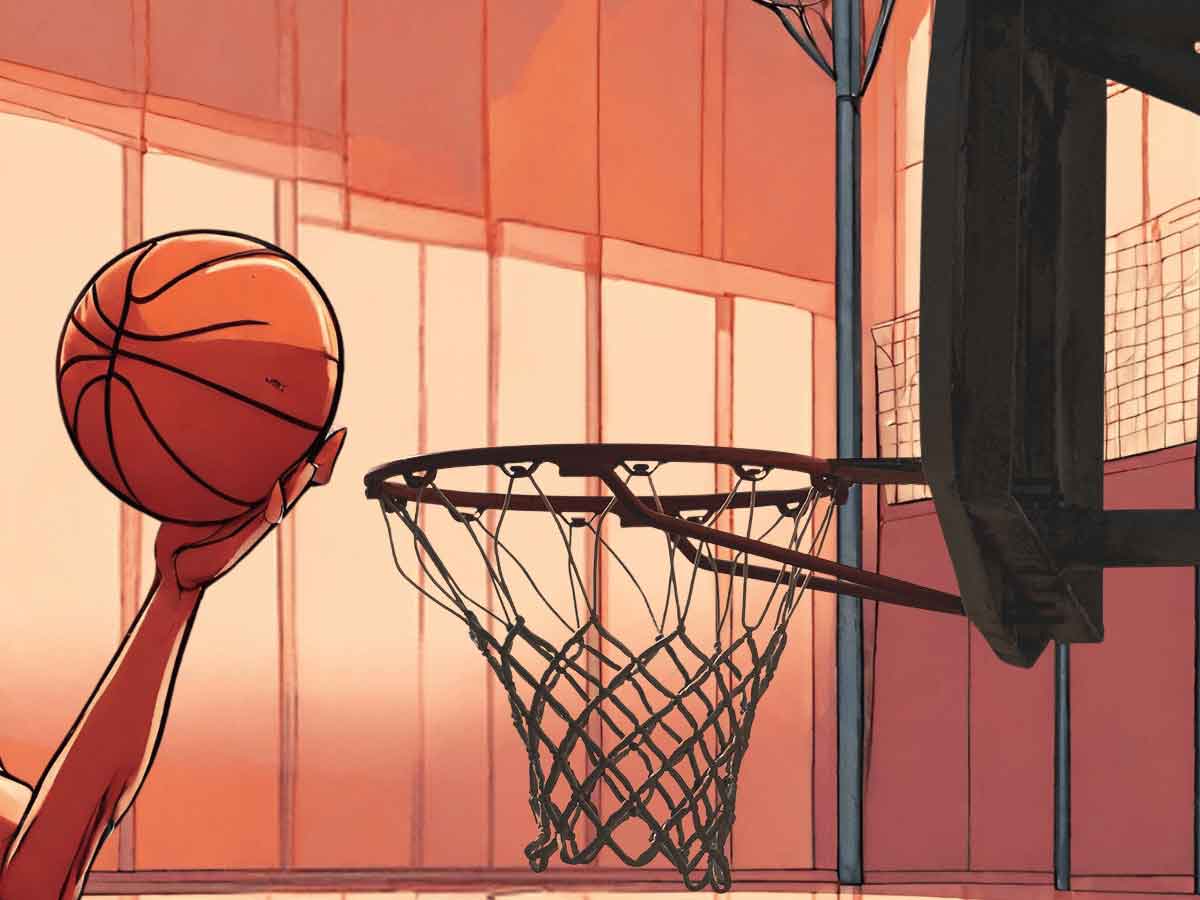Updated April 9, 2024
If you’ve played basketball even once, you know the truth: height gives you a huge advantage. And if you watch any competitive game, you’ll notice the players are noticeably taller than the average person.
So, what’s up with this correlation between height and basketball? Are taller people more likely to play and succeed at the sport, or does playing basketball make you taller?
Here’s the truth:
While some theories suggest basketball may positively impact height, genetics ultimately determine how tall you will be. There is no scientific evidence that shows playing basketball makes you taller.
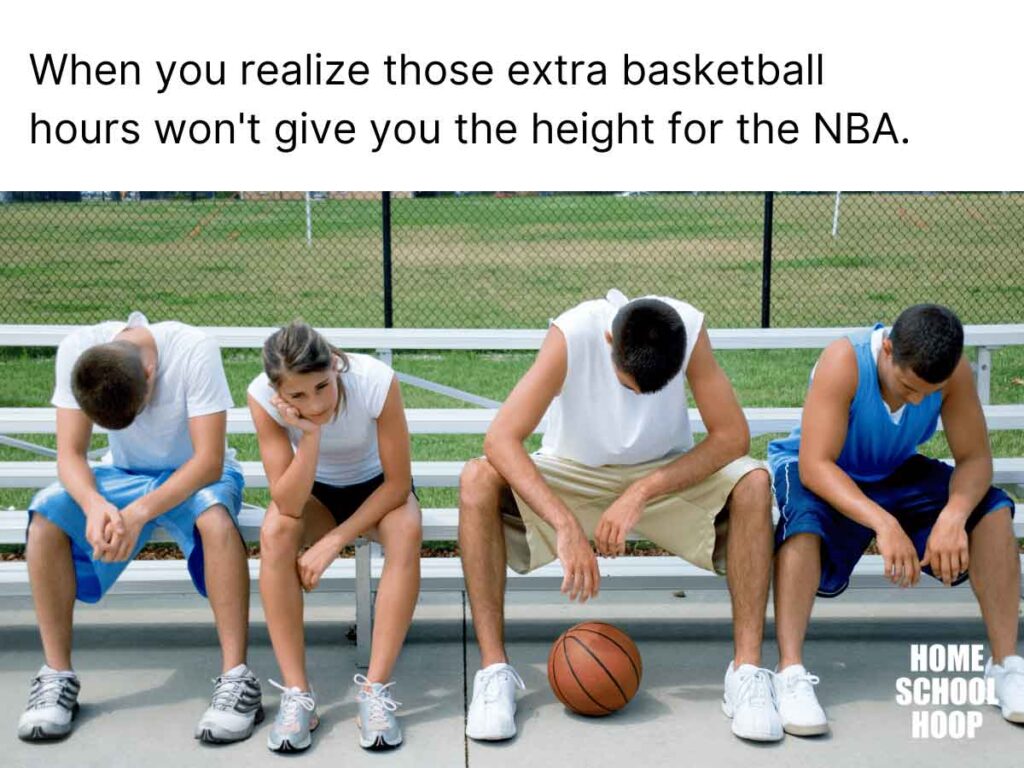
I know how you must be feeling – but, stick with me.
We’ll explore the science behind height increase and its potential correlation with playing basketball. We’ll also debunk those myths you’ve likely heard so you have realistic expectations when it comes to correlating hoop with height.
Is There Scientific Evidence?
No, no definitive scientific evidence proves playing basketball directly makes you taller.
With that said, some interesting findings that have been observed that suggest there could be a correlation. For example, the world’s best players in the NBA and WNBA are significantly taller than the average person. To some, this suggests that there may be an association between basketball and height.
There is also a theory that the physical activity involved in playing basketball, including continuous jumping, may stimulate the release of growth hormones. This can lead to increased height, particularly when we’re young, as human growth hormone is responsible for the growth and development of the body.
Even so, any height increase you may receive by boosting your human growth hormone with basketball activities is still limited by other factors in and out of your control—mainly your genetics, diet, historical exercise, and environment.
Plus, you generally stop growing taller once you go through puberty. So, if you’re an adult, you can stop jumping up and down with the hopes you’ll squeak out some more inches. Truth is, you’re unlikely to increase your height despite any efforts to grow taller.
Average NBA and WNBA Height
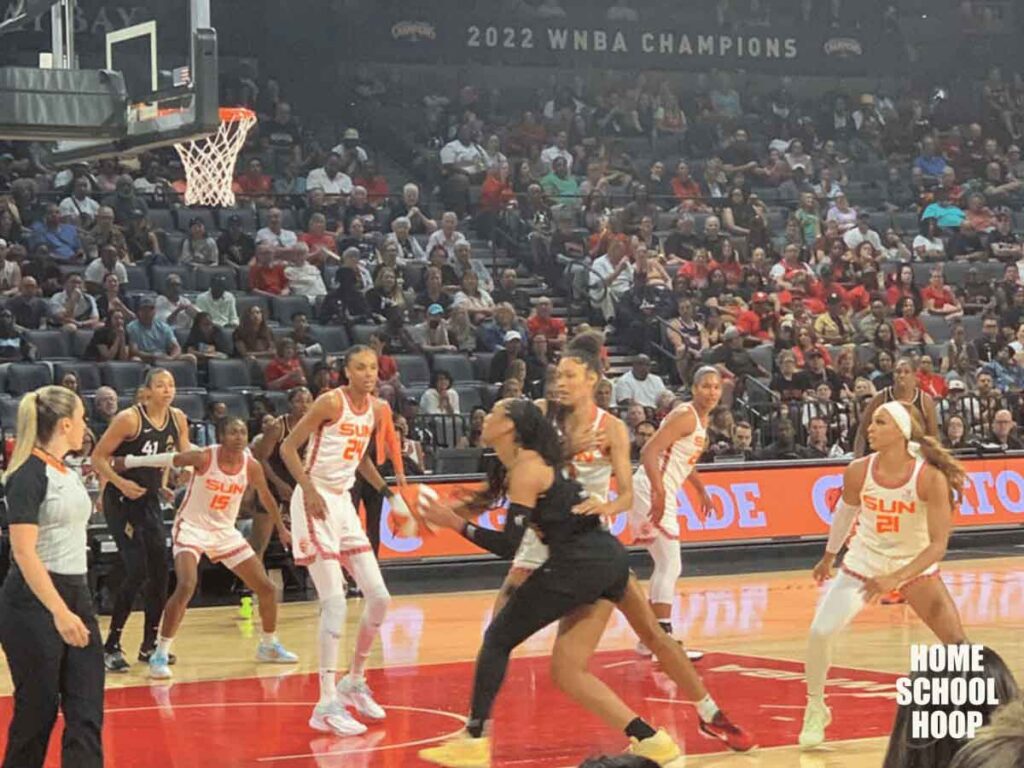
It’s true that top basketball players are generally taller. Even as professional basketball leagues prioritize skill over size, those elite hoopers you see on TV still tower over the typical person.
The average NBA height (2023-2024 season) is 6’6.5″, giving those players an incredible 8 inches over the 5’9” average height male in the United States. Centers, which tend to be the tallest NBA players on the basketball court, often surpass 7 feet in height.
The average height of players in the WNBA is just over 6’0” (2023 season), positioning them 8 inches over the average woman in the U.S. at 5’4”. Han Xu, who plays center for the New York Liberty and is the tallest current WNBA player, stands at 6’11”.

Okay, so if there’s not much truth to basketball increasing height, why are basketball players so tall?
The reality is tall people are drawn to basketball because of the advantages their size offers. Height gives players an edge over competitors, making them more likely to make it to the league and succeed.
That’s not to say shorter players at all levels can still succeed at basketball. But, as former Utah Jazz coach Frank Layden said, “You can’t teach height.” While height is not the only determining factor in whether a player will make it to the NBA or WNBA, it is one of the main things that recruiters look for in players for their rosters.
PPG Calculator Tool: What is PPG in Basketball?
Flopping in Basketball Explained: Taking a Close Look at the Controversial Tactic
Understanding Goaltending in Basketball: Rules, Differences, and Famous Controversies
What Really Contributes to Height Growth?
If you’re looking for a tactic to grow taller, I’m sorry to share that playing basketball isn’t going to help. NBA and WNBA players and anybody else who decides to play competitive basketball do not suddenly gain inches.
Genetics plays the most significant role in how tall you will be. According to Healthline, genetic factors account for roughly 80% of your final height. More than 700 unique genetic variants go into determining your height.
That leaves about 20% that are attributed to environmental effects, as pointed out by molecular biologist Chao-Qiang Lai for Scientific American. So, theoretically, you can also encourage growing taller by focusing on several environmental factors that have been identified as helping maximize growth potential:
- Get Enough Sleep: Getting enough sleep is not only helpful for getting taller, it’s crucial for growth and development. Your body releases human growth hormone (HGH) while you sleep. Aim for at least 8 hours per night to support healthy growth, although extra sleep may increase HGH production even more.
- Follow a Nutritious Diet: Giannis Antetokounmpo may munch on candy on the sidelines. But if you’re trying to get taller, you’ve got to give your body the nutrients it needs for overall health and growth. Ensure your diet includes a variety of nutrient-rich foods, such as fresh fruits and vegetables, lean proteins, and whole grains. Try to stay away from high amounts of sugars and trans and saturated fats.
- Put in the Exercise: Engaging in regular workouts, including playing basketball, promotes HGH production and helps promote overall health and strengthen bones. And don’t forget about stretching to help improve flexibility and encourage good posture.
- Genetics: While you can’t control your genetics, you can optimize your growth potential by adopting a healthy lifestyle and following the above recommendations. Doing so helps positively influence other factors affecting your height, such as healthy hormone levels.
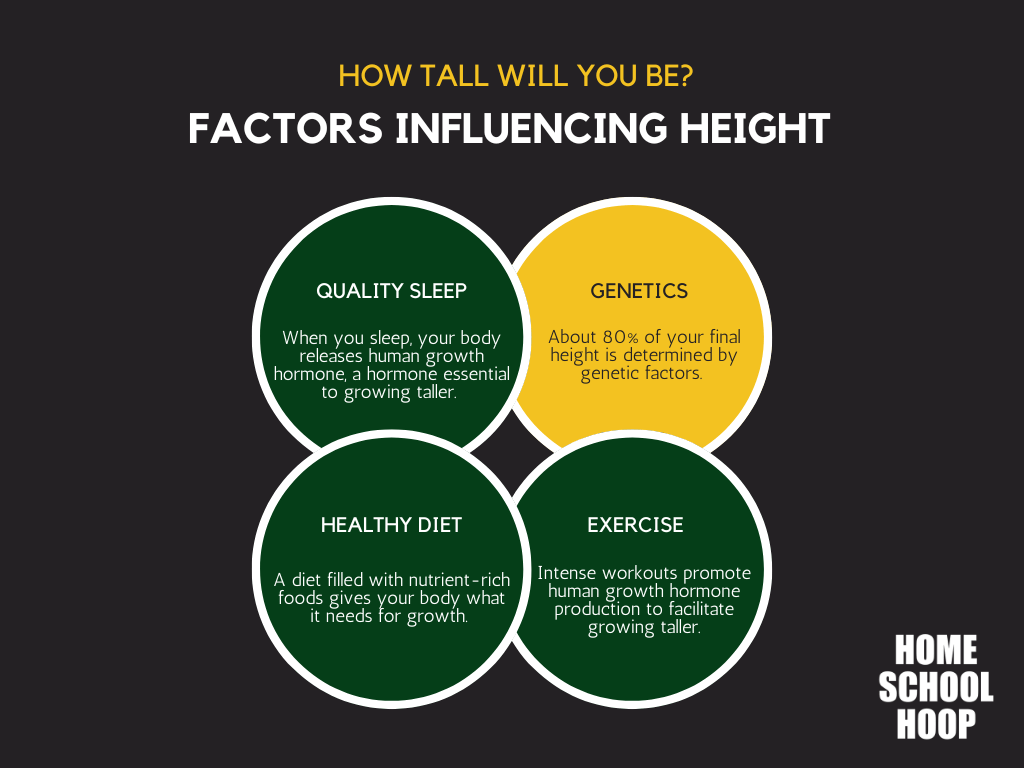
Remember that the age at which somebody stops growing varies, but you’ll likely have reached your peak height by the time you’re done with puberty.
- For boys, this usually happens around age 16.
- Girls hit puberty about two years earlier than boys, at age 14.
With that said, some can continue to grow until their early 20s, depending on various factors such as genetics and overall health.
Height’s Significance in Succeeding at Basketball
Height is far from the end all, be all of dominating in basketball. There are many examples of the shortest NBA players succeeding with their skill, quickness, and ingenuity (see Stephen Curry and Allen Iverson).
But, let’s be honest – height is undoubtedly nice to have. That’s why so many tall people gravitate to basketball.
You’re given some valuable advantages when you tower over your competitors, such as:
- Control Over the Game: With longer limbs and a higher vantage point, you can keep the ball away from defenders and maintain possession more easily.
- Rebound Dominance: When you’re taller, you can reach higher and secure more rebounds, providing your team with extra possessions and limiting your opponent’s opportunities.
- Stronger Defensive Presence: You can leverage your extended reach to block shots, disrupt passing lanes, and discourage opponents from driving to the basket. Players often alter their shots when facing a taller opponent to avoid getting blocked.
- A Wider Passing Target: Height allows you to reach higher and wider, giving your teammates bigger passing lanes. Because of your greater reach, your teammates can deliver all types of entry passes that your defender will have a harder time getting to.
- Better Court Vision: Height allows you to see over defenders and identify open passing lanes more effectively. When you’re taller, you can often deliver passes that would be challenging for the other team to intercept, contributing to better ball movement and offensive flow.
- Scoring Efficiency: Being taller lets you get your shot off more easily. You can more easily shoot over defenders, leading to higher shooting percentages. Plus, the proximity to the basket improves shot accuracy.
While tall athletes are often associated with basketball, height can be advantageous in many sports. Volleyball, for example, also requires players to jump frequently to spike and block.
Learn more: How tall is a basketball hoop?
How Are Basketball Players So Tall? Genetic Selection and Training
If you’re like me, you watch those towering figures in college and pro basketball and feel a bit of jealousy of how such valuable heights are attained. The answer lies in two factors: 1) genetic predisposition, and 2) healthy behaviors that maximize a person’s height potential.
As you now understand, genes are the primary factor that determine how tall you or anybody else can and will become. The thing is that basketball favors taller individuals, leading to a larger pool of athletes who are lucky enough to have a more impressive height.
When basketball players grow to these heights varies. Many see major growth spurts during their high school years, which contributes to their young success and sets them up for collegiate and professional play. These growth spurts also often coincide with the time that players get more serious about their basketball development.
David Robinson and Scottie Pippen are two such NBA Players that experienced significant height increases during high school. But that’s not always how it happens. Six-foot-four WNBA star Breanna Stewart, who has won multiple WNBA Championships, grew taller before she hit high school.
Not to harp on the main point of why you’re here, but — it’s important to reiterate that tall basketball players didn’t grow taller because they played the sport. Many players may have been tall from an early age and naturally gravitated towards basketball due to their height advantage.
Learn more: What is a double double in basketball?
How Tall Do You Have to Be to Play Basketball?
There is no height requirement to play basketball. Height can provide advantages, but players of all sizes can make a positive impact. So whether you’re tall, of average stature, or on the shorter side, you have a place on the team if you’re willing to put in the effort to develop your skills.
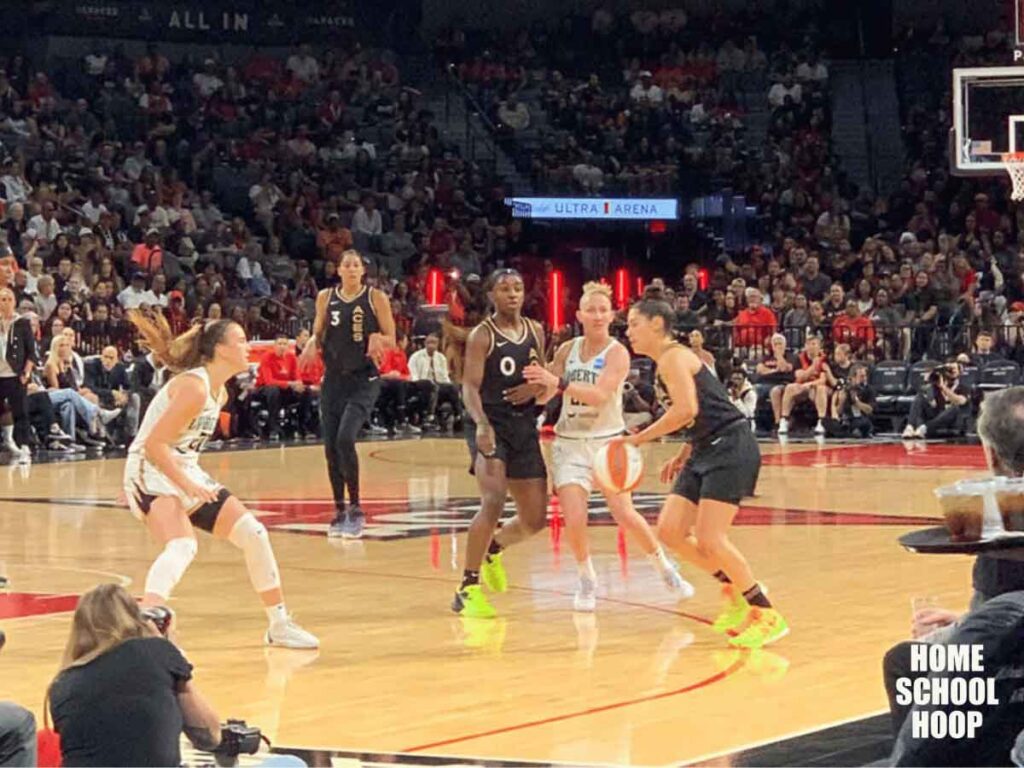
Focus on Your Skills
In basketball, skills reign supreme. Shooting accuracy, ball-handling finesse, and strategic decision-making make you excel. While height might offer advantages in certain situations, your proficiency in these fundamentals genuinely makes the difference.
The ability to sink a three-pointer, execute a flawless pass, or play tenacious defense doesn’t rely solely on height but on your dedication to honing your craft. Some of the smallest NBA stars and shortest WNBA players excel at skills.
Be an Ultimate Team Player
Height is an asset, but effective teamwork, communication, and collaboration can elevate your performance. Your willingness to work with and support your teammates can set you apart and make you a valuable asset to your team.
Break the Mold
Yes, taller players might be advantageous for rebounding, throwing down alley-oops, and shot-blocking. However, basketball history is rich with examples of players who defied conventions. Guards like Chris Paul and Kelsey Plum have showcased that exceptional skills can dominate the game, irrespective of height.
Learn more: What is a rebound in basketball?
Debunking Common Myths About Height and Basketball
As you look into whether playing basketball makes you taller, you’re likely to encounter a variety of myths and misconceptions that can cloud your understanding.
There are several out there surrounding height increase and basketball. Some of these include:
- Stretching Can Elongate Your Bones: You may have heard that stretching exercises can lead to longer bones and increased height. The reality is the length of your bones is primarily determined by genetic factors and growth plate activity. Stretching can improve posture and alignment but won’t result in drastic height changes.
- Hanging from a Bar: Michael Jordan claimed to have hung from a bar to increase his height. Sorry, while hanging might stretch out the muscles and make you feel better, no scientific evidence supports this method for getting taller.
- Drinking Milk: While milk can support overall bone health, there is no direct evidence to suggest that drinking milk alone can increase height.
- Height Pills: Beware of any products or supplements that claim to increase height. These are often expensive and need more scientific backing. They also can be unsafe.
- Shoe Insoles: The market is flooded with products promising miraculous height increases through shoe insoles. The best basketball insoles might provide a temporary height difference while wearing them. But insoles that claim to increase height by providing a hidden boost or stimulating pressure points on the feet are not scientifically proven effective.
- Playing Basketball Stunts Your Height: Some parents worry the impact and intensity of basketball can negatively affect a young player’s growth. Science tells a different story. Engaging in basketball and other physical activities while growing can support overall development.

Does Jumping Make You Taller? Understanding the Science
Jumping, while playing a big role in basketball and other sports, doesn’t significantly increase your height. While it’s a common misconception that jumping can elongate your bones and make you taller, there’s no science to show that’s true.

Once again, your height is primarily determined by genetic factors. Your traits, including how tall you are or are going to be, are passed down from past generations. Jumping, no matter whether it’s while you’re playing basketball or working out, does not alter this.
Now, there is one caveat: Jumping during puberty, or while you’re still growing, can encourage human growth hormone production and support bone growth. Theoretically, this could effectively help with boosting your height and overall body development.
Learn more: How long are basketball games?
Why Play Basketball
If you were hoping to learn that basketball does make you taller, I’m sorry. As exciting as the idea is, distinguishing between facts and fiction is important.
If you love the game, this shouldn’t deter you from still playing. And remember, height does not solely determine success in basketball or any other sport.
Your skill, dedication, and work ethic – all of which are under your control – also factor in to how successful you become as a player. So, as the Dawn Staley quote says, “Control what you can control.” Enjoy playing basketball for the love of the game, and embrace your height, whatever it may be.

